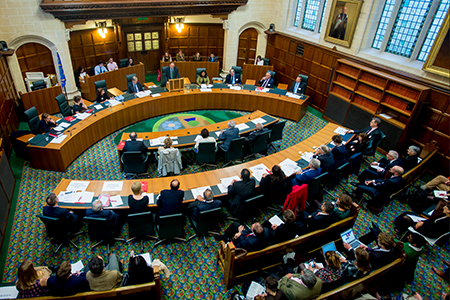THE CONSEQUENCES OF THE SUPREME COURT CASE
The Brexit Supreme Court case result, was not so surprising, given the shambolic and incompetent way in which the Government’s lawyers, led by the Attorney General, had conducted the case.
As I have mentioned in a previous posting not only did they agree to things that they certainly should not have agreed to, making life much easier for the Remainers to win the case, but also failed to argue the points that they ought to have argued. The most significant failure was to do what the Government had promised to do in the booklet that they sent out to all voters i.e. to immediately implement the decision and also David Cameron and Jeremy Corbyn had both stated in Parliament that if Leave won then the Article 50 notice would be served the very next day. Here we are, however, months later with it still not served and now there is an irreversible ruling by the Supreme Court that there now has to be an Act of Parliament to authorise the service of the Article 50 notice.
It is not, however, certain that the Supreme Court ruling is bad news in the longer run. This is firstly because we do not know whether Theresa May’s Government will easily be able to get an Article 50 authorising Act of Parliament through Parliament. Maybe it will go through quickly. In which case the court case has been something of a waste of time with regard to the process of Brexit.
If, on the other hand, it is blocked in Parliament that will give Theresa May a “cast iron” Cause to have a snap General Election. I suspect that, if that happens, Labour will be very seriously damaged and UKIP would be completely wiped out since May would be campaigning for Article 50 to be activated.
The other reason why it is not certain whether this court case might not be a good result in the longer term is for us as English nationalists.
In the Supreme Court Judgment it has been made crystal clear that Scotland, Wales and Northern Ireland have no role in Brexit.
The immediate response of the Scottish National Party has been shrill and, with all due respect to Nicola Sturgeon, ill-considered. I always think it is tactically unsound to get involved in battles that you cannot win. Far better to be more modest in your aims in order to have small victories.
In First World War military doctrinal terms I am for “bite and hold” rather than the French military doctrine of the “Offensive à outrance” under which massed ranks of infantry with fixed bayonets were poured into the “beaten zone” of chattering machine guns. The delusional French “Offensive à outrance” was developed because of the French nationalist revanchist obsessional wish to be revenged for the humiliation of the Franco-Prussian War; perhaps a somewhat similar state of mind to Nicola Sturgeon’s increasing departure from reality.
Quite apart from the incongruity and philosophical incoherence of a Party claiming to be nationalists want to be ruled from Brussels, I would also just comment that Nicola Sturgeon’s strategy is quite incoherent, given that she claims she wants to get into this fight because Scotland is going to be taken out of the EU against its Will. However if she were to succeed in her Independence Referendum in getting Scotland out of the UK, Scotland will then be out of the EU as well! Go figure!
In any event it looks as if there is going to be a second Independence Referendum for Scotland, perhaps in 2019.
So far as English nationalists are concerned that is undoubtedly good news, since it is not unlikely that it will further awaken English awareness of the Scottish political class’s contemptuous attitude towards England and us English.
Anything that helps English People come to awareness of their Englishness and raises their consciousness of the separateness of England and its separate Interests is good for English nationalism!
There is, in addition, the juicy possibility that the British Constitution as it currently stands will be blocked and incapable of activating Article 50. If that does prove to be the case then the only way out of the EU for England will be the dissolution of the United Kingdom. This would trigger automatic exit, by bringing to an end the UK which is the Treaty Accession State. Ironically enough that would mean that Scotland and Northern Ireland are automatically out, not only of the UK, but also of the EU!

